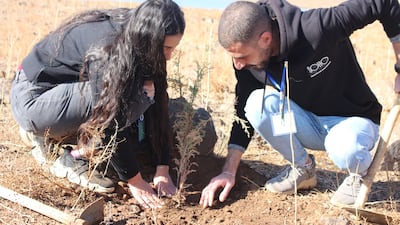A youth-led campaign to replant trees is reviving Syria’s ravaged forests and orchards, breathing new life into the environment of a country devastated by climate change and deforestation linked to its 12-year civil war.
A report in March by the Dutch NGO Pax, based on satellite analysis, concluded that one-third of Syria’s tree cover has been lost since fighting began in 2011.
Many of the trees were chopped down by Syrians desperate to warm their homes and cook food amid a crippling energy shortage.
Even before the conflict, Syria was losing tree cover at an alarming rate.
From 2001 to 2011, the country lost about 4,650 hectares of forested area, according to a report by Syria Direct that said excessive logging, overgrazing and illegal oil refining were among the causes. A UN estimate in 2010 said 2.7 per cent of land in the country was forest.
In recent years a string of climate-induced crises have made it worse. In 2020, unusually strong wildfires ripped across the country’s Mediterranean coast, devouring more than 8,900 hectares of olive and fruit orchards. In 2021 Syria experienced its worst drought in 70 years, according to the Ministry of Local Administration and Environment.
Huge swathes of land once lush with citrus and olive trees sit black and barren.
Precisely how much tree loss comes down to the erratic effects of climate change as opposed to war is unclear. Not enough field studies have been carried out in Syria to make that type of assessment, said agricultural engineer Rasha Haj Al Obaid.
Whatever the case, civil war and economic isolation have compounded the problem.

Syrians have had little choice but to cut down trees for firewood. With the oil-rich north-east controlled by US-backed Kurdish forces, and under sanctions that target its oil industry, Syria faces a devastating energy shortage.
The price of heating oil has soared, so to warm their homes, Syrians have turned to burning wood logs. And as the price of wood has climbed, Syria’s precious stock of trees has suffered.
What is Green Bridges?
Ward Gharzeddine is one of dozens of volunteers who have joined the Green Bridges, a new youth-led initiative that is planting trees in Sad Al Roum, in southern Syria.
“Our reforestation campaign aims to give back to our beautiful planet and land, which have been badly damaged in recent years as a result of the war and despicable human behaviour,” said Mr Gharzeddine, 29.
In Sweida province, where Sad Al Roum is located, more than 10,000 trees have been chopped down since 2015, Mr Gharzeddine said, quoting data from province's agricultural directorate.
The Green Bridges are pushing back. Since the group’s launch in November, it has planted 4,000 trees, restoring life to a 1.5 square kilometre patch of Sad Al Roum, who vineyards and natural beauty once made it a major tourist destination.
The campaign began in 2022 when a group of environmental activists, engineers and others from Sweida got together.
They gathered donations from the local community to start buying plants. They obtained some of the seedlings from Sweida's agricultural directorate, while some volunteers set up their own nurseries to begin planting seedlings to be used later in the campaigns.

During their campaigns, the volunteers split up into groups. One digs up earth, while another plants the seedlings. After the fledgling plants are in the soil, another team makes follow-up visits to make sure they stay properly watered.
The reforestation initiative prioritises resilient species such as harmony maple, sumac, bitter almond, Atlantic birch and hawthorns, as well as coniferous trees. These are the types best suited to withstand the climate of Sad Al Roum, which is about 1,400 metres above sea level.
The campaign, funded through local donations, has also set up arboretums to revive threatened species like the carob, an evergreen famous for its sweet-tasting molasses.
One of their biggest challenges is drumming up interest in the environment among a population exhausted by war, economic stagnation and the February earthquakes that killed nearly 6,000 Syrians and reduced apartment blocks to rubble.
Mr Gharzeddine says the campaign nevertheless aims to expand to all of Syria. He is hopeful it will make a difference.
“Hand in hand, we will recultivate our martyred lands,” he said.
This article was produced in collaboration with Egab.

